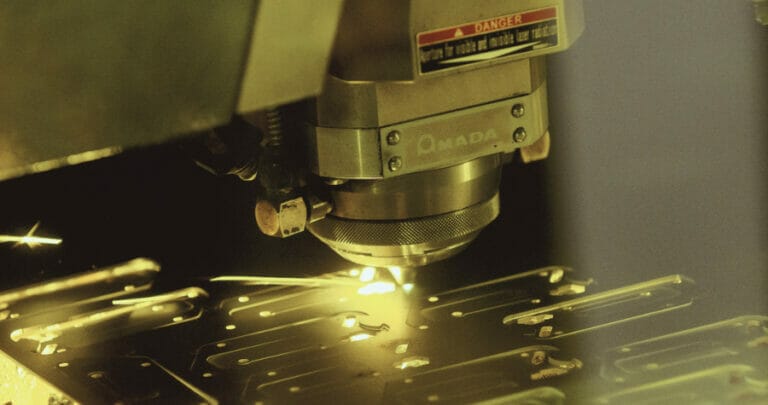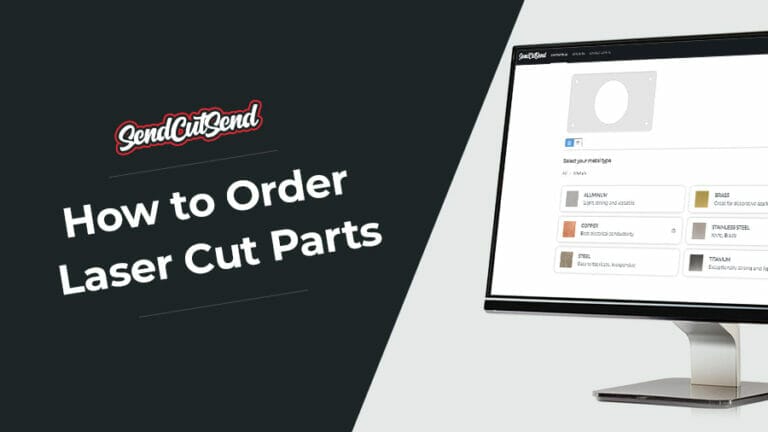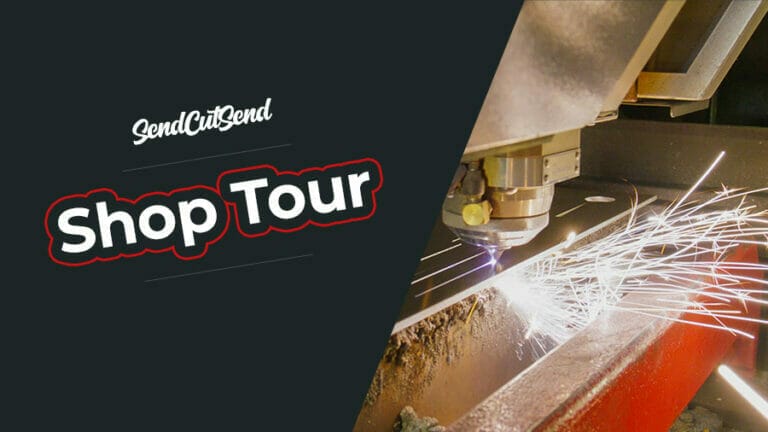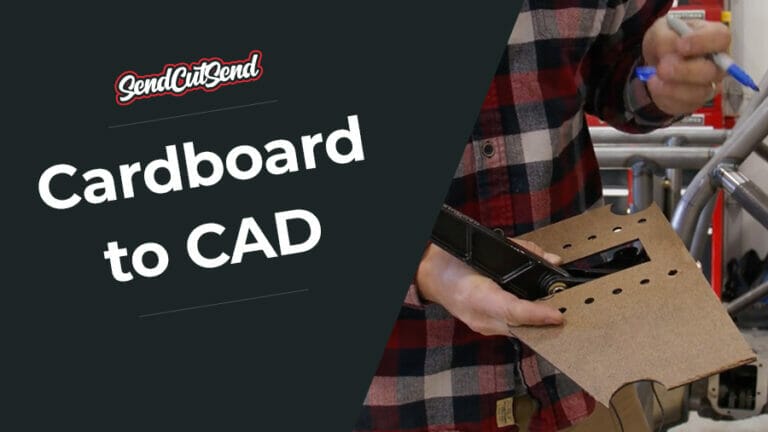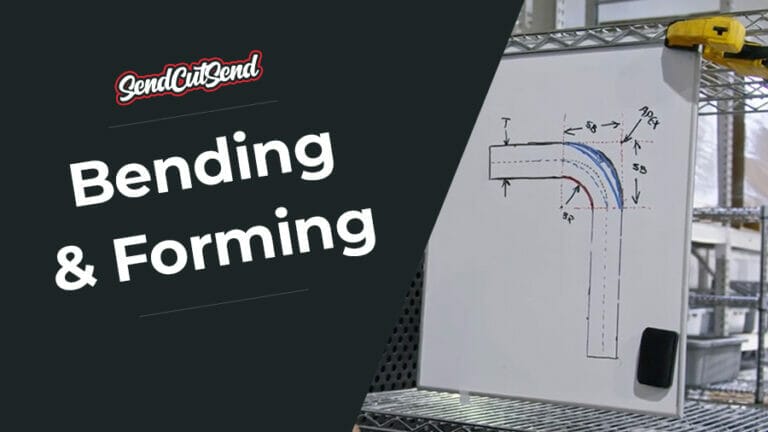There are several types of CNC (Computer Numerical Control) machines used in manufacturing. In today’s market anyone can purchase a CNC machine to manufacture custom laser cut parts, but the price needs to be right. Many SendCutSend customers have a small CNC router in their garage, but turn to the big guys (us) for more complex cutting or larger projects.
In this article we’ll discuss the cost of CNC machines and what impact that will have on your project.
CNC Machine Prices: 7 Factors to Consider
The cost of a CNC machine can vary widely depending on the type of machine and what you need it for. Here are some of the main factors that affect CNC machine costs, along with an explanation of each:
Machine size
A 3kW laser cutter will cost significantly less than a 12kW because of the difference in size and power. Same goes for a small desktop CNC mill vs. a mill with a 5’x5’x5’ work envelope. Larger machines tend to be more expensive because they require more material, components, and are more complex to manufacture. The types of parts you are making dictate the size of the machine you need, so be prepared to pay more for a larger machine if you need large parts.
Machine complexity
The complexity of the machine’s design and construction also plays a role in its cost. Machines with more advanced features and capabilities, such as multiple axes of motion or built-in automation, tend to be more expensive. Yes, that 20-position automatic tool changer is awesome…but it’s going to add to your CNC machine cost.
Machine accuracy
CNC machines that offer higher levels of accuracy and precision are typically more expensive. Machines with tight tolerances and advanced calibration systems are more challenging to design and build, which can drive up their cost. Inexpensive hobby CNC machines might be accurate to +/- 0.010” or better, which is usually good enough for a garage workshop. Expect to pay more for a machine that can achieve +/- 0.0003” or better. A lot more. Each thousandth of an inch can mean the difference of $10,000 to $100,000.
Machine speed
Machines that can operate at high speeds tend to be more expensive than those with lower speed capabilities. High-speed machines require more powerful motors, specialized components, and more robust control systems (such as Fanuc or Mitsubishi controllers). Although high-speed machines might be more expensive, they can also be more productive, often offsetting the increased costs with increased production. Sometimes trying to save money by buying a slower machine can cost you more in the long run.
Material compatibility
CNC machines that can work with a wide range of materials, such as metal, plastic, and wood, are generally more expensive than those that are limited to specific materials.
Brand and reputation
The brand and reputation of the CNC machine manufacturer can also affect its cost. Machines from well-known and respected manufacturers tend to be more expensive than those from lesser-known brands.
Additional features
Optional features such as automatic tool changers, coolant systems, and software packages can add to the cost of a CNC machine.
In terms of specific costs, CNC machines can range from a few thousand dollars for a small hobby machine to several hundred thousand dollars for a large industrial machine. It’s essential to consider all of the factors listed above when deciding on the right CNC machine for your needs and budget.
5 CNC Machine Tools
There are several different types of CNC machine tools including laser cutters, waterjet cutters, CNC routers and more. The machining process for each tool varies and impacts what the machine is used for and how much it costs.
CNC Laser Cutters
These machines use a high-powered laser to cut through a variety of materials, including metal, copper, wood, acrylic and more. At SendCutSend our CNC laser cutters range from 4kW to 12kW.
CNC Waterjet Cutters
Waterjets use a high-pressure stream of water mixed with abrasive particles to cut through difficult materials such as Carbon Fiber, G10, Linen Phenolic and more.
CNC Routers
These machines use a rotating cutting tool to carve out shapes and designs from a wide variety of composites, acrylics, and wood. CNC routers can achieve sharp edges and tight tolerances that are typically impacted by the heat of a laser.
CNC Milling Machines
These machines use rotary cutting tools to remove material from a workpiece. They can perform a range of operations, including drilling, tapping, and cutting, and are ideal for producing complex shapes and parts.
CNC Plasma Cutters
These machines use a high-velocity jet of ionized gas (plasma) to cut through metal. They are commonly used in the metal fabrication and automotive industries.
How Much CNC Machines Typically Cost
| CNC Machine Category | Cost |
| Entry level desktop CNC routers | $150-$500 |
| Hobby level CNC router | $1,000- $3,000 |
| Hobby level CO2 laser | $1,000-$3,000 |
| Hobby/Small Business plasma table | $1,000-$5,000 |
| Professional CNC Machine | $50,000-$100,000 |
| Entry-Level 3-axis Mill | $50,000-$100,000 |
| Industrial HD plasma tables | $40,000-$120,000 |
| Industrial Fiber Laser | $100,000 – over $500,000 |
| Production 3-axis CNC Milling Machines | $100,000-$500,000 |
| Production 5-axis CNC Milling Machines | Over $500,000 |
For each of these machines there are several factors that come into play when determining the price. These factors include: size, power, cutting speed, precision, materials, brand and reputation, software, working area size, automation features, and additional features.
Other Costs Related to CNC Machines
In addition to the above factors, there are additional tools, accessories, and licenses that might be necessary for CNC processes that could present additional costs. Depending on the machine, the tools may include lubricants and coolants, twist drills, a milling vise, inspection and measuring tools.
You also need to factor in the cost of staffing a machine with operators, material and storage costs and maintenance needs. All of these additional costs could run several hundred to thousands of dollars depending on the size of your operation.
5 Things You Should Consider Before Buying a CNC Machine
Before purchasing a CNC machine, consider the following to help make an informed decision.
Your specific needs
Consider the type of work you’ll be doing with the CNC machine and the materials you’ll be using. This will help you determine the size, power, and type of machine that will best suit your needs.
How much space you have
Consider the amount of space you have available for the machine, including the machine’s footprint and the space needed for any necessary accessories and material storage.
Your budget
Of course budget is a factor, that’s why you’re reading this article. As we’ve discussed, taking into consideration the initial investment plus installation, necessary accessories, operation, and maintenance costs can help determine the total cost of ownership of a CNC machine.
Technical requirements
Technical requirements including power supply, ventilation, and necessary infrastructure modifications need to be kept in mind before purchasing a CNC machine.
Software and compatibility
Determine the software requirements of the machine and ensure that it’s compatible with your existing software and hardware. Also, consider the ease of use of the machine’s software and any necessary training.
Should you outsource?
If you’re an individual or small business or shop you may determine that outsourcing your CNC machining needs to a manufacturer, like SendCutSend, makes more financial sense than purchasing a machine in house. Outsourcing is a great solution to avoiding the costly investment and maintenance of a personal machine.
Buying Used CNC Machines and Equipment
Another option for saving money on a CNC machine is to buy used. There is really only a market for used machines that cost $10k or more, but buying used could save you big money. We’re talking anywhere from several thousand to several hundred thousand dollars depending on the type of machine you’re looking to purchase.
Websites like MachineTools are a great place to buy and sell machinery and can help give you an idea of how much you can save when buying used.
If you decide to buy used, you want to make sure to do your due diligence on inspection. Check things like how noisy it is at speed, the machine time on the CNC, stored alarms, alarm history, maintenance logs, leaks, etc.
Reduce Your CNC Machining Costs With SendCutSend Services
For many creators and small businesses a personal CNC machine makes financial sense. Even for larger businesses the investment can be worthwhile. However, for many, outsourcing your project to a manufacturer like SendCutSend is more cost effective and efficient.
We house a number of CO2 lasers ranging from 4kW-12kW, industrial waterjet cutters, and industrial CNC routers. These machines work quickly and accurately, saving you time and money. We also keep things affordable with low minimum pricing and free shipping on all standard orders. In addition, we offer in-house services such as bending, powder coating, anodizing, plating, and hardware so you can have your part made exactly how you need all in one place. Visit our website to learn more about our services and get an instant pricing.
